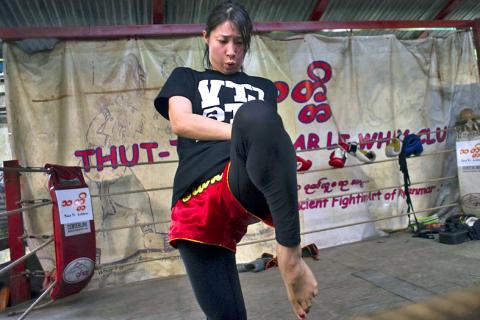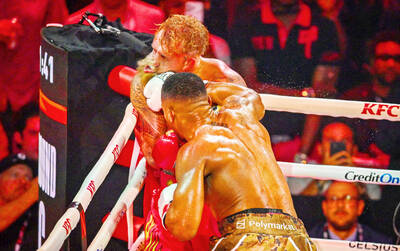Moe Pwint Oo shoots the grimy punchbag a steely glare before slamming her fist into it, striking a blow for equality as she practices Myanmar’s homespun martial art Lethwei — a sport that encourages head-butting and grants victory by knock-out only.
The petite medical sciences student is one of a growing number of women taking up Lethwei kickboxing, building up a sweat in the yard of a gritty Yangon gym where some of the country’s best fighters train alongside local enthusiasts, expatriates and even the odd actress.
“I think Lethwei is becoming really popular here because I see a lot of my friends here as well, but I am here to box, not to socialize,” Moe Pwint Oo said, as a woman from Japan practiced spin kicks in a makeshift ring behind her.

Photo: AFP
Lethwei fighters say their sport is the toughest member of Southeast Asia’s kickboxing family, leaving Thailand’s more famous Muay Thai in the blood-flecked dust thanks to its disdain for gloves and use of skull-cracking head-butts.
To win a Lethwei fight, you must batter your opponent unconscious, or to the point where they surrender. If no one gets knocked out in five three-minute rounds, the match ends in a draw.
It is perhaps little wonder that few women traditionally enter the ring in Myanmar, where gender norms favour demure damsels over fearsome fighters.
However, that has begun to change in recent years as gender roles shift, spurred by the country opening up to the world after decades of isolating military rule.
Opposition leader Aung San Suu Kyi is the most famous of a growing number of female politicians, while an impressive roster of successful businesswomen is taking advantage of the most buoyant economic outlook in decades.
About half of the regulars at the Thut Ti (“Courage”) gym are women — drawn to the intensity of the fitness level and authenticity of skill required in Lethwei.
Having spent years outside her homeland, Moe Pwint Oo said she “wanted to do something very traditional, very Burmese” in her summer break from studying at Aberdeen University in Scotland.
Carvings on the temples of Bagan, which dot the central Myanmar plains, appear to show pairs of men locked in combat, suggesting the sport is more than 1,000 years old, said Win Zin Oo, founder of the Thut Ti gym, who is also a former vice president of the Myanmar Lethwei Federation.
In modern times, it was kept alive in the eastern border states of Karen and Mon, where kickboxing bouts are held to mark everything from monks’ funerals to New Year festivities.
Spectators in front row seats are close enough to hear bones shatter and be sporadically showered with blood, sweat and spittle.
However, the tournaments are seen as family affairs and many include bouts with boys as young as 10.
Win Zin Oo said that the bare-knuckle fighting style was “robust.”
“All components of the body can be used as weapons; punches, knee strikes, elbow beats, head butts, you can throw [your opponent]... If you want to compete in the real Lethwei ring as a professional, you must be really tough,” he said.
He normally advises enthusiasts not to attempt a fight.
For those who do, endurance is as important as aggression.
Lethwei boxer Tha Pyay Nyo, who has a formidable record of more than 150 matches and only one defeat, gave up farming in his native Karen State to take up the sport professionally because “I might be famous one day.”
The 25-year-old recently branched out into mixed martial arts, or “cage fighting,” competing in his debut international tournament as part of the first ONE Championship event in Myanmar.
The televised tournament was a chance to showcase some of the fighting spirit of a national sport that has languished in the shadow of its better-known Thai cousin.
“I want the world to know our courage through Myanmar traditional boxing,” Tha Pyay Nyo said before the match.
Win Zin Oo hopes Myanmar will borrow from the success of its Thai neighbors in promoting its own kickboxing brand.
His gym is increasingly popular and the women who train there now include local models, singers and actresses.
He said there was some “sensitivity” about how women should be treated, but insisted the gym did not discriminate.
“Some [female] students they are really really good, even in terms of decisiveness, I think. So it’s a little unfair [to say:] ‘oh women are weak, men are strong,’” he said.
When she returns to Scotland, Moe Pwint Oo will have to make do with Muay Thai, in which headbutts are banned and protective clothing is worn, to keep training.
However, she said she was hooked on Myanmar’s more fearsome version.
“It makes you fit, it’s traditional and then you know it’s very empowering, especially for women,” she said.

LOW-GOAL SHOOT-OUT: Of the nine penalties in the shoot-out, only three went in, with Flamengo’s Samuel Lino, and Vitinha and Nuno Mendes of PSG netting Matvei Safonov on Wednesday made four straight penalty saves in a penalty shoot-out to help Paris Saint-Germain beat Flamengo in the Intercontinental Cup final and win a sixth trophy of the year. The Russian goalkeeper was thrown in the air by his teammates after his exploits in the shoot-out, which was won 2-1 by PSG after a 1-1 draw after extra-time. It completed a trophy-laden 12 months for the French team, who had already won the Trophee des Champions, Ligue 1, the Coupe de France, the UEFA Champions League and the UEFA Super Cup — also on penalties against Tottenham Hotspur in

LACKLUSTER FIGHT: At one stage, the referee lost patience with the two fighters, warning them in the fourth round that ‘the fans did not pay to see this crap’ Former world heavyweight champion Anthony Joshua on Friday knocked out YouTuber-turned-boxer Jake Paul in their controversial Netflix-backed bout in Miami. The fight at the Kaseya Center, which saw both men reportedly splitting a mammoth purse of US$184 million, had triggered alarm across boxing due to the gulf in physical size and class between Britain’s two-time former world champion Joshua and Paul, an Internet personality who has forged a lucrative career through a handful of novelty boxing contests. However, in the event, Joshua made hard work of defeating his vastly less accomplished opponent, before his superior size and power eventually told

Paris Saint-Germain (PSG) were ordered on Tuesday by a French labor court to pay their former forward Kylian Mbappe up to 61 million euros (US$71.6 million) in unpaid wages and bonuses. France captain Mbappe, who left PSG in June last year to join Real Madrid, had been claiming more than 260 million euros in total from his former club. PSG in turn had demanded Mbappe pay them 440 million euros. Mbappe, 26, also claimed the Qatari-owned reigning European champions had applied the wrong French legal classification to his contract, but that was rejected by the court. The labor court said

The Africa Cup of Nations (AFCON) would in future be held every four years instead of every two years, the Confederation of African Football (CAF) said on Saturday. The surprise decision was made at the body’s executive committee meeting in Rabat and announced at a news conference by CAF president Patrice Motsepe. The tournament, which brings in an estimated 80 percent of CAF’s revenue, has traditionally been held every two years since its inception in 1957. Yesterday marked the start of the 35th edition, hosted in Morocco with the home team taking on Comoros. Motsepe said the next AFCON finals,